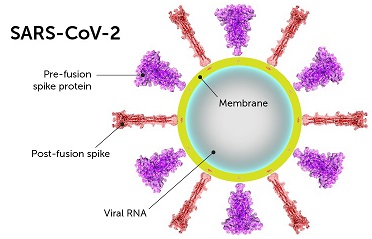COVID-19 News: Study Finds That SARS-CoV-2 Spike Protein Induces Endothelial Inflammation Via ACE2 Independently Of Viral Replication
Thailand Medical News Team Aug 30, 2023 1 year, 7 months, 3 weeks, 12 hours, 14 minutes ago
COVID-19 News: The global pandemic caused by the novel coronavirus, SARS-CoV-2, has wreaked havoc on a global scale, affecting millions of lives and economies worldwide. While primarily known as a respiratory illness, COVID-19 has shown a notable link to cardiovascular complications as shown in various case reports, studies and
COVID-19 News reports. Individuals with pre-existing cardiovascular conditions are at a higher risk of severe COVID-19, and emerging evidence suggests that the virus might lead to post-infection cardiovascular issues. In light of this, researchers from McGill University in Canada and the University of Glasgow in the UK have embarked on a groundbreaking study to delve into the mechanisms underlying the inflammation observed in COVID-19 patients.

The study explores the relationship between the virus and a specific cellular receptor known as angiotensin converting enzyme 2 (ACE2). ACE2 is an integral membrane glycoprotein that plays a crucial role in regulating the renin - angiotensin - aldosterone system (RAAS) and maintaining cardiovascular homeostasis. Notably, SARS-CoV-2 uses ACE2 as its gateway into human cells, attaching to it via a viral coat protein known as the spike protein.
The spike protein, or S protein, is composed of two subunits: S1 and S2. The S1 subunit contains the receptor binding domain (RBD) that attaches to ACE2, while the S2 subunit facilitates the fusion of the viral envelope with the host cell membrane. The interaction between the spike protein and ACE2 enables the virus to enter host cells, leading to infection and subsequent COVID-19 symptoms.
However, the study findings are groundbreaking because it suggests that the spike protein's interaction with ACE2 might have broader implications beyond viral entry. The study team sought to understand whether the spike protein, when binding to ACE2, triggers an inflammatory response in endothelial cells, which are critical components of the blood vessel lining.
The team exposed human endothelial cells to a recombinant form of the SARS-CoV-2 spike protein, specifically the S1 subunit (rS1p). Their investigations revealed that this exposure induced the production of various inflammatory molecules, including IL-6, MCP-1, ICAM-1, and PAI-1. These molecules are known to play roles in inflammation, clotting, and immune response, all of which are relevant to COVID-19 pathology.
Furthermore, the researchers observed that the spike protein triggered the activation of nuclear factor kappa-light-chain-enhancer of activated B cells (NFκB) and extracellular signal-regulated kinase 1/2 (ERK1/2) signaling pathways in endothelial cells.
These pathways are known to be key players in inflammation and immune response. The activation of these pathways by the spike protein indicated that the interaction with ACE2 could lead to a pro-inflammatory environment within the endothelial cells.
The team's findings also shed light on the potential involvement of ACE2 in this inflammatory process. They discovered that ACE2 contributed to the inflammation induced by the spike protein, and this effect was not linked to the enzyme's catalytic activity. ACE2 serves as a chaperone protein fo
r an amino acid transporter known as B0AT1, which plays a role in membrane anchorage. This study suggests that ACE2's role goes beyond its enzymatic function and might involve direct cellular signaling.
Furthermore, the study team investigated whether the inflammation triggered by the spike protein was a consequence of viral replication within the endothelial cells. To their surprise, they found that the spike protein-induced inflammation occurred independently of viral replication. This suggests that the interaction between the spike protein and ACE2 is sufficient to induce inflammation in endothelial cells, even without the presence of replicating virus.
The implications of these findings are profound, as they offer a new perspective on the mechanisms underlying COVID-19-associated endothelial inflammation. By demonstrating that the spike protein can independently induce inflammation via ACE2, the study proposes a novel role for ACE2 in COVID-19 pathogenesis.
While previous research has primarily focused on ACE2's enzymatic activity and its role in viral entry, this study highlights its potential involvement in cellular signaling and inflammation, which could contribute to the cardiovascular complications observed in COVID-19 patients.
In conclusion, the collaborative effort between researchers at McGill University and the University of Glasgow has uncovered a new layer of complexity in the relationship between SARS-CoV-2 and human cells.
The study's findings suggest that the virus's spike protein, when binding to ACE2, triggers an inflammatory response in endothelial cells, potentially contributing to the cardiovascular complications associated with COVID-19. This groundbreaking research not only advances our understanding of the virus's pathogenesis but also highlights the need for further investigations into the multifaceted interactions between SARS-CoV-2 and host cells. As the world continues to grapple with the ongoing pandemic, these insights could pave the way for new therapeutic strategies and interventions to mitigate the impact of COVID-19 on cardiovascular health.
The study findings were published in the peer reviewed journal: Scientific Reports.
https://www.nature.com/articles/s41598-023-41115-3
For the latest
COVID-19 News, keep on logging to Thailand Medical News.
